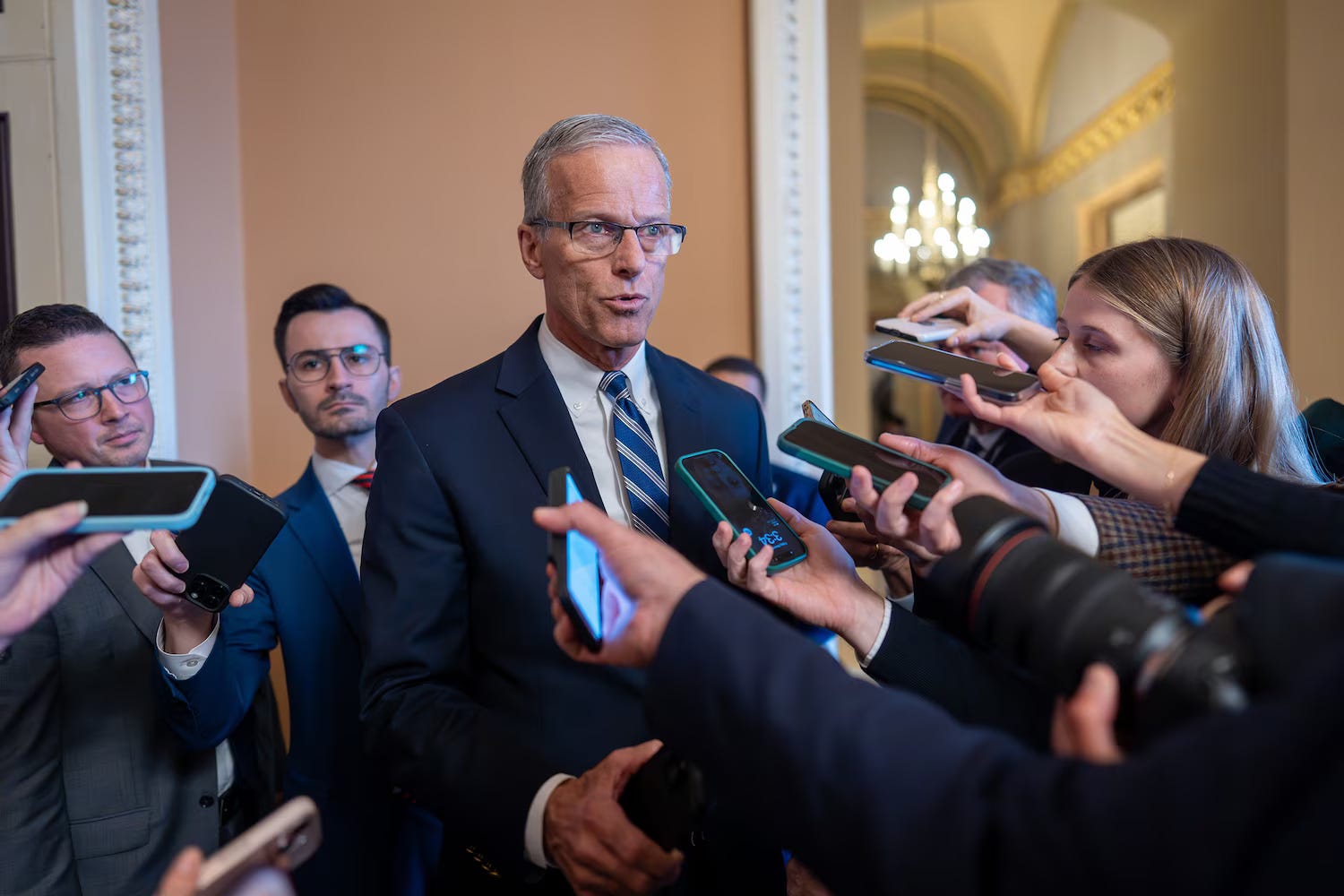Senate clears way for bipartisan deal to end shutdown
With the support of just enough Democrats, Republicans took the first step to reopening the government—without conceding to their opponent’s key demands.

Eight Democrats on Sunday night paved the way for the Senate to end the longest government shutdown in American history and fully fund the government through next September. But the agreement excludes key Democratic priorities, including extending the enhanced Affordable Care Act premium tax credits as Americans face harsh sticker shock during the first days of annual open enrollment.
The bipartisan agreement keeps federal funding levels at fiscal year 2025 funding levels through the end of next January, pairing a short-term continuing resolution with passage of a three-bill minibus covering military construction, the Veterans Affairs and Agriculture Departments, the FDA, and congressional operations.
The deal, primarily negotiated on the Democratic side by Sens. Jeanne Shaheen (D-N.H.), Maggie Hassan (D-N.H.) and Angus King (I-Maine), reverses all reduction-in-force actions since the start of the shutdown and bars any new RIFs for the duration of the CR, guaranteeing back pay and benefits to affected federal employees. It fully funds SNAP through the 2026 fiscal year at higher levels to prevent further disruptions to food assistance programs.
And it includes a Senate vote by the end of the second week of December on a Democratic bill to extend the ACA subsidies, though that vote is expected to be largely symbolic. Even if Democrats find the more than a dozen Republican votes required to extend the tax credits, Speaker Mike Johnson (R-La.) has not committed to holding a vote in the House.
While Democrats won meaningful policy and workforce protections, they failed to secure their two core shutdown demands—an actual extension of the ACA tax credits and protections against rescissions in future spending rounds.
The 40-day impasse began to thaw late Sunday night with a 60–40 procedural vote that will allow the Senate to start the process of swapping the text from the stopgap funding bill the House passed in mid-September with the substance of the Senate deal. (The House hasn’t voted since then, which was over 50 days ago.)
“I don’t need to go over all the reasons why it’s imperative that we get the government open as soon as possible,” Senate Majority Leader John Thune (R-S.D.) said ahead of the vote. “I am optimistic that after almost six weeks of this shutdown, we’ll finally be able to end it.”
Senate Minority Leader Chuck Schumer (D-N.Y.) emerged from a lengthy private caucus meeting opposing the deal, an about-face from March, when he and a handful of leadership-aligned Democrats voted to advance a similar continuing resolution to final passage.
“This healthcare crisis is so severe, so urgent, so devastating for families back home, that I cannot in good faith support this CR that fails to address the healthcare crisis,” Schumer said. “We will not give up this fight. We will deliver for the American people.”
Sens. Dick Durbin (D-Ill.), Tim Kaine (D-Va.) and Jacky Rosen (D-Nev.) flipped their votes with Shaheen and Hassan after opposing the 14 previous Republican-led attempts to reopen the government. Sens. Catherine Cortez Masto (D-Nev.), John Fetterman (D-Pa.) and King were the only Senate Democrats to vote in favor each time, including tonight.
Sen. Jon Ossoff (D-Ga.), the most vulnerable Senate Democrat in 2026, voted against advancing the package—along with Sen. Brian Schatz (D-Hawaii), who’s in line to be the number-two Senate Democrat in 2027 and potential successor to Schumer. Sen. Rand Paul (R-Ky.) was the only Republican to oppose the measure.
The House is expected to return within 48 hours to take up the package if it clears the Senate.
House Minority Leader Hakeem Jeffries (D-N.Y.) said in a statement this evening that House Democrats would oppose any Senate compromise without an extension of the ACA tax credits.
“We will fight the GOP bill in the House of Representatives, where Mike Johnson will be compelled to end the seven-week Republican taxpayer-funded vacation,” he added. “Donald Trump and the Republican Party own the toxic mess they have created in our country and the American people know it.”
But Jeffries lacks the votes to stop any bill from passing if Speaker Johnson can maintain unity among his conference. Eyes will be on a handful of House Democrats who could cross the aisle, which would expand Johnson’s margin.
I’m told House Democrats will likely hold a Zoom call in the next 24 hours to discuss the Senate framework and allow members to vent their frustrations with their Senate counterparts in a private forum.
But we’re a ways from House floor action.
The Senate will next need to secure 60 votes on two more procedural motions before final passage of the package. The process can be expedited with unanimous consent, but any senator can prolong it in protest.

